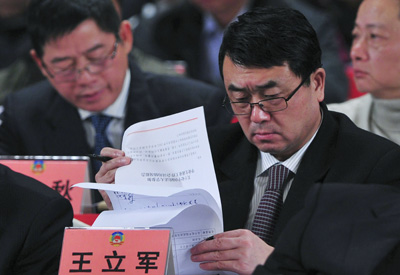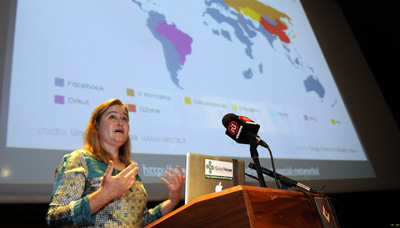Kristin Jones/CPJ Asia Program
Kristin Jones, a consultant to CPJ's Asia program, is an independent investigative reporter. In 2011, she was part of a team that won a Robert F. Kennedy Journalism Award for "Seeking Justice for Campus Rapes," a collaboration between NPR and the Center for Public Integrity. Jones was CPJ's senior Asia research associate until 2007. She led writing on the CPJ report "Falling Short," which documented press freedom abuses in China ahead of the 2008 Olympic Games.
Will China’s new detention law matter? Ask Zhang Mingyu
“Zhang Mingyu isn’t out of danger yet.” These words, posted at 7:37 p.m. Wednesday on the Sina Weibo account of Chongqing property developer Zhang Mingyu after his detention by police, mark the latest twist in a story of political intrigue leading up to this week’s legislative meetings in Beijing. As required by China’s hardworking censorship…

‘Invisible Tibet’ blogger elicits China’s extra-judicial ire
Beijing-based blogger Woeser reported on her website Invisible Tibet today that she has been confined to her residence by Beijing public security officers who are stationed outside her home. Woeser, an outspoken critic of Chinese government policies in Tibet, has written about a series of recent self-immolations among monks and arrests of writers in western…

Bangladeshi journalists call for justice in couple’s murder
On February 11, two Bangladeshi television journalists, Meherun Runi and her husband Golam Mustofa Sarowar, were murdered in their Dhaka home. Their 5-year-old son found their bodies. No arrests have yet been made and no motive has been publicly disclosed, although police claim they know why the couple was killed. Journalists have plenty of reason…

In high-tech China, low-tech media control works too
China’s investment in high-tech Internet surveillance technology is well known, and the byzantine rules of its Central Propaganda Department have inspired books and academic treatises. But among the many tools in the box for media control, there’s one that’s very simple and low-tech: Keep journalists away.

Chinese media little help with Chongqing mystery
The website of Xinhua News, China’s state media flagship, leads today with EU’s threats of sanctions against Syria. Elsewhere on their Chinese-language site, one can read about Wen Jiabao’s remarks to the visiting Canadian prime minister, or look at photos of pretty white ladies lounging around, if that’s your style.

Does the Internet boost freedom? We decide, book says
The Internet doesn’t bring freedom. Not automatically, anyway. That’s one of the main messages of Rebecca MacKinnon’s new book, Consent of the Networked, which had its New York launch at the offices of the New America Foundation last night. In a conversation with CNN managing editor Mark Whitaker, MacKinnon, a CPJ board member, said it’s…

Chinese press has impact, against the odds
In China, state control over the media hasn’t become more lax in recent years. Each year brings a new excuse for Communist Party censors to tighten the screws. The year of the rabbit brought the Arab Spring, and fears of a Jasmine Revolution. The year of the dragon brings a major political transition.
Oprah’s guards not only ones to assail Indian journalists
Oprah Winfrey’s first visit to India brought delighted coverage by the Indian media. Her meetings and tweetings with Bollywood stars, her bright orange sari, and her trips to slums and to the Taj Mahal were lovingly detailed by newspapers and TV outlets in that country.